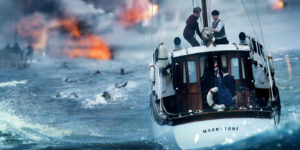Dunkirk: Failure Presented as Triumph
Thinkpiece Thursday
Christopher Nolan’s well-reviewed film, Dunkirk, revisits a part of British history that, with a PR reversal, turned utter failure and defeat into triumph and glory.
British government propaganda spread misleading information after the battle and refused to publicly accept that Dunkirk was an unmitigated disaster of biblical proportions. Winston Churchhill, in private conversation at the time, described Dunkirk as “The greatest British military defeat for many centuries”
“The Dunkirk episode was far worse than was ever realized in Fleet Street (the British newspaper quarter). The men returning to England were so demoralized they threw their rifles and equipment out of railway-carriage windows. Some sent for their wives with their civilian clothes, changed into these, and walked home.””
Director of Statistics at the War Office
Military men who were on the scene recount the situation:
“We were lost for words. I don’t know how to put it. We were just so demoralized and humiliated. I could not believe how well-equipped the Germans were. I had just a few months with a rifle and no proper field training and there they were with all this equipment and organization. They were prepared for war and we weren’t.”
Ivan Daunt, Queen’s Own Royal West Kents
“If you ask anybody what they remember most clearly about (…) Dunkirk they will all mention two things – shame and exhaustion. Shame-as we went back through those white-faced, silent crowds of Belgians, the people who had cheered us and waved to us as we came through their country only four days before, people who had vivid memories of a previous German occupation and whom we were now handing over to yet another. I felt very ashamed. We had driven up so jauntily and now, liked whipped dogs, we were scurrying back with our tails between our legs.” Brigadier Brian Horrocks, BEF
But that’s not what everyone remembers. What they remember is the brave flotilla of fishing boats, private pleasure craft, and commercial trawlers braving the channel and bringing the boys home when the British Navy couldn’t help. On the first day of the evacuation, only 7,669 men were evacuated, but by the end of the eighth day, 338,226 out of 400,000 soldiers had been rescued by a haphazard assembly of over 800 boats. Private citizens had rescued the surviving British Expeditionaryy Forces. It’s a better story than shame and defeat caused by strategic incompetence.
The film, Mrs. Miniver, tells the usual side of the story, Nolan’s film shows a bit more of the untold reality of shame, confusion, and despair but also leans heavily on heroism. For a full dose of British pluck here is a TMC clip of Mrs. Miniver:
Compare that to scenes from Dunkirk:




Create a visual map for a character’s emotional journey. Pull stories from character rather from rote story structure beats. Some of the largest international media companies, use this in story and character development.


A clear concise guide for writers and producers to have by their side as they embark on a project. It gives a really vital reminder of what is key for story success.


No comment yet, add your voice below!